This document provides an overview of programming with Go Lang. It discusses why Go Lang is useful, including its support for multicore performance, microservices, concurrency, static binaries, and testing. It then covers various Go Lang content like first apps, types, loops, functions, arrays/slices/maps, interfaces, methods, empty interfaces, pointers, and error handling. Code examples are provided to demonstrate many of these concepts.
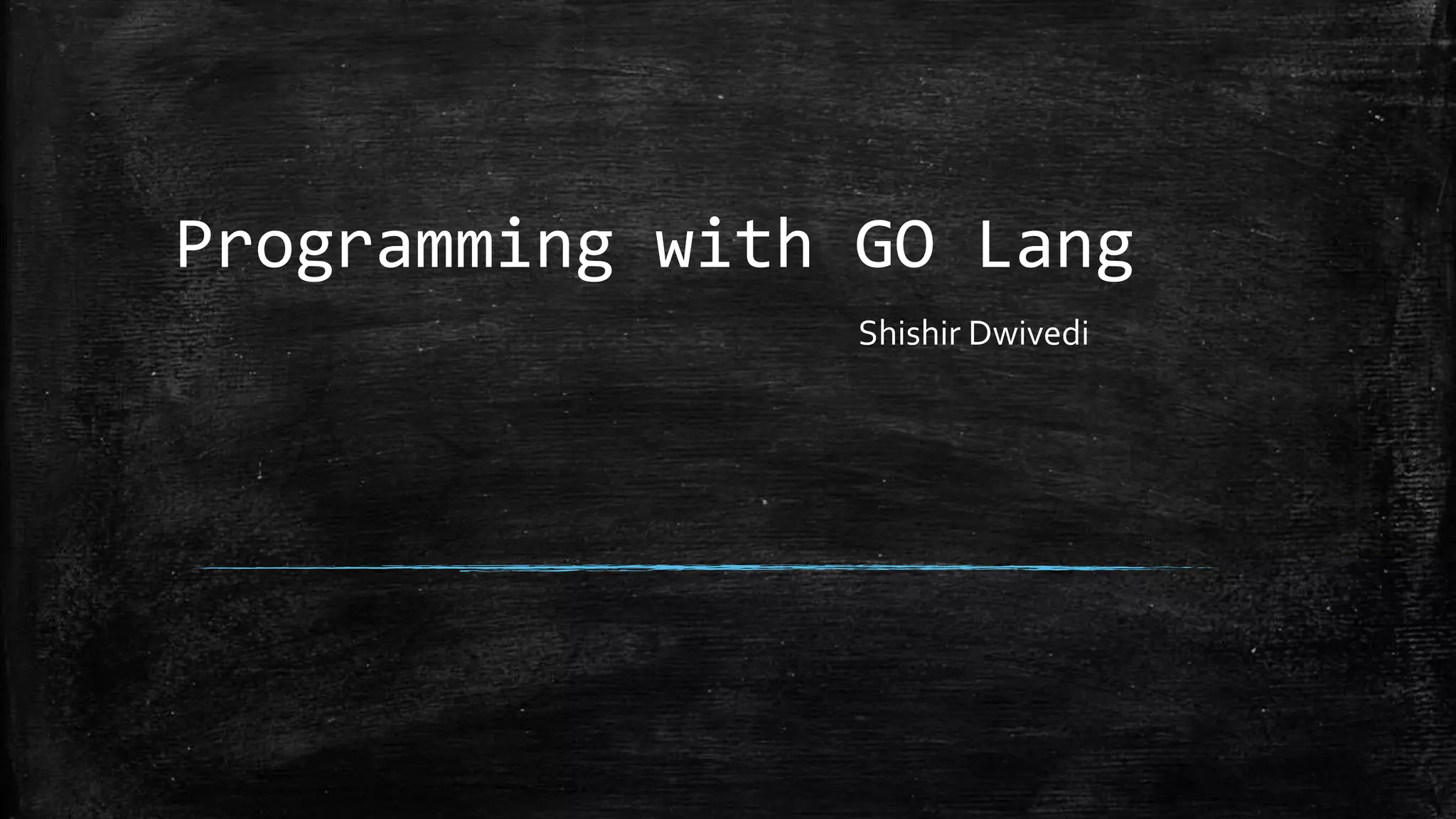

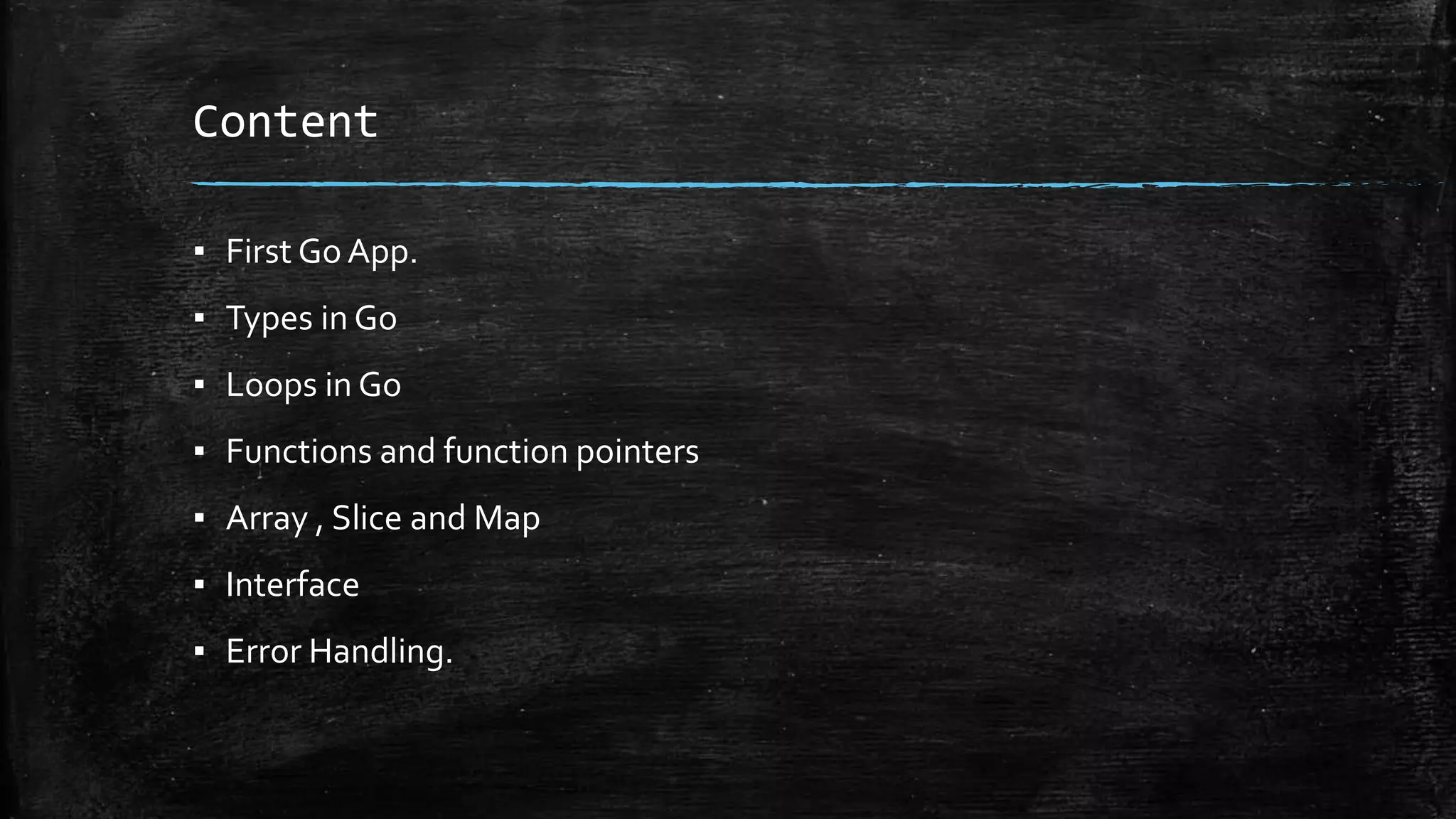
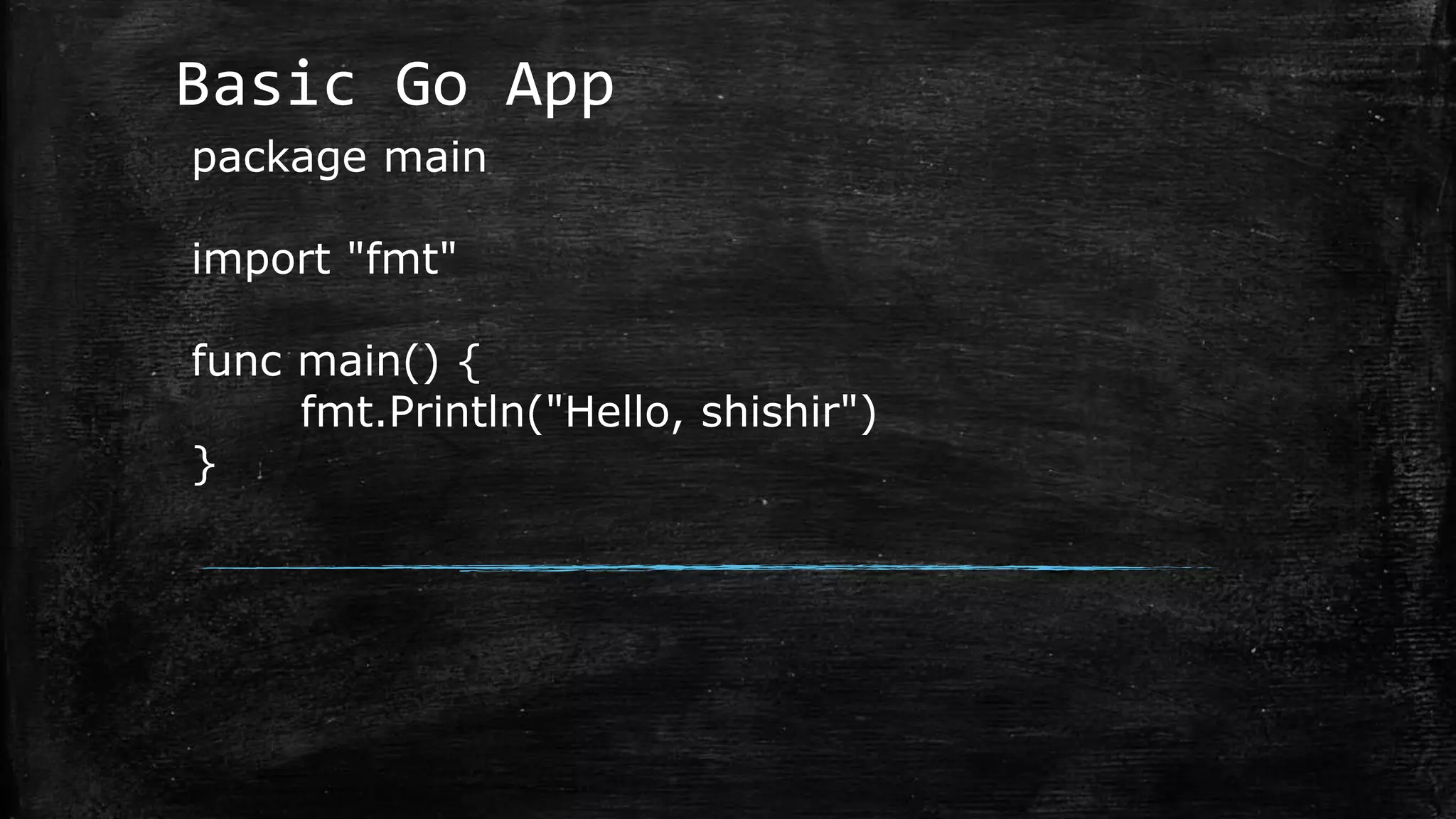
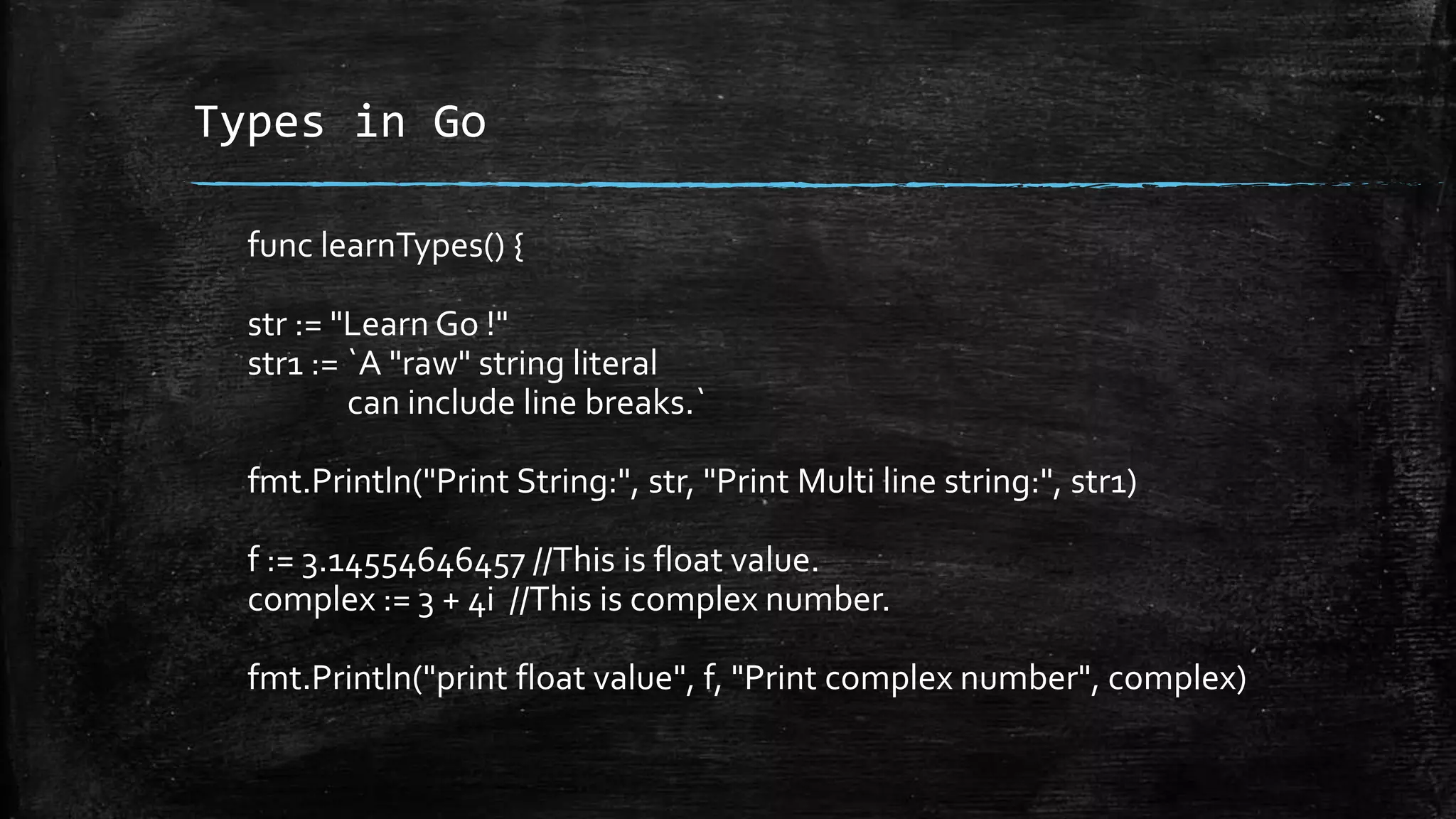
![Types in Go
var arr [4]int //delcaration of array. At run time default value of int will be
given //which is 0
arr1 := [...]int{2, 4, 6, 78, 9, 90, 0}
fmt.Println("arr with default value", arr, "array with init value", arr1)
}](https://image.slidesharecdn.com/cccd0064-141c-42b0-903d-eba725fdca9c-161229122320/75/ProgrammingwithGOLang-6-2048.jpg)
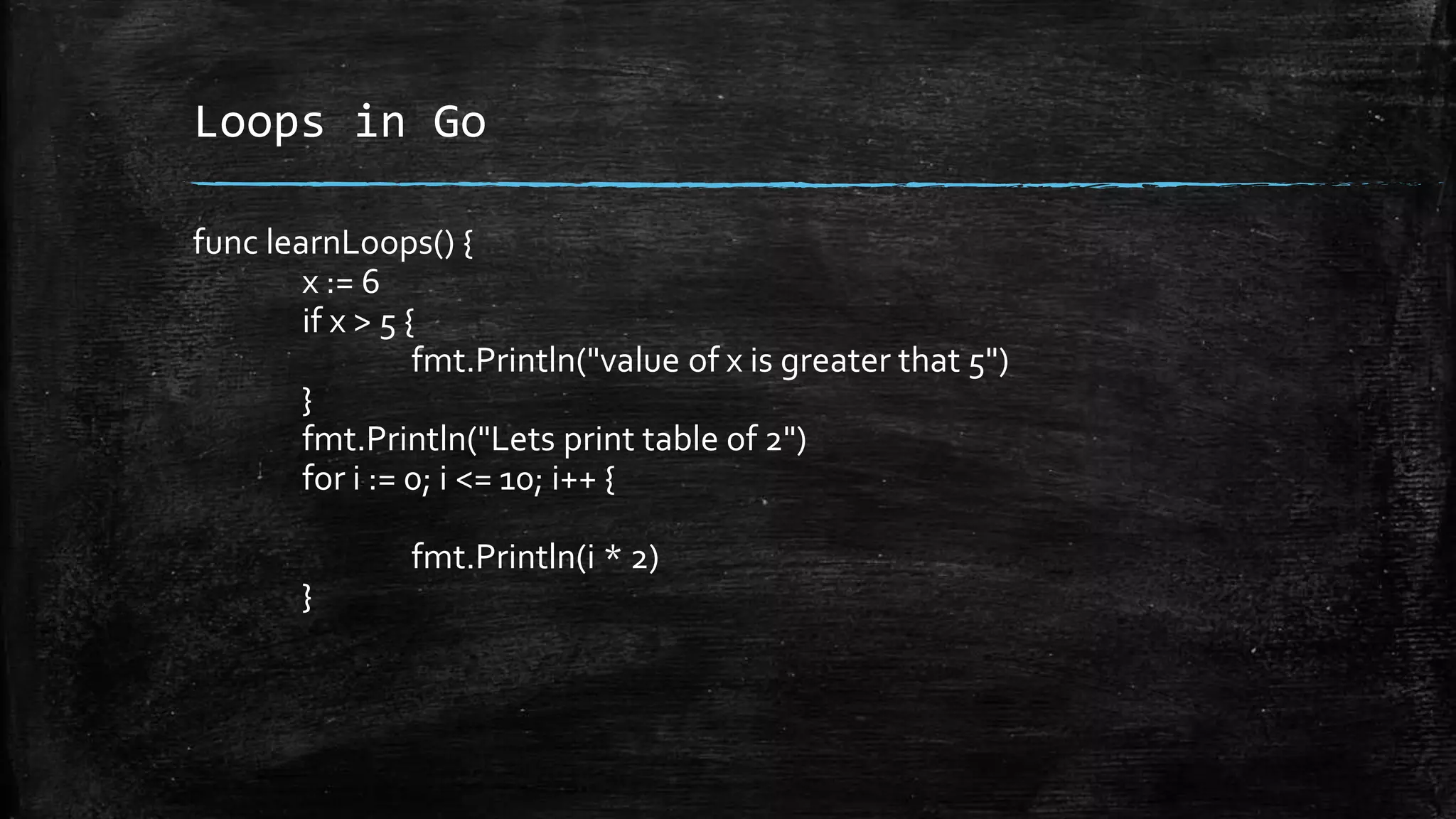
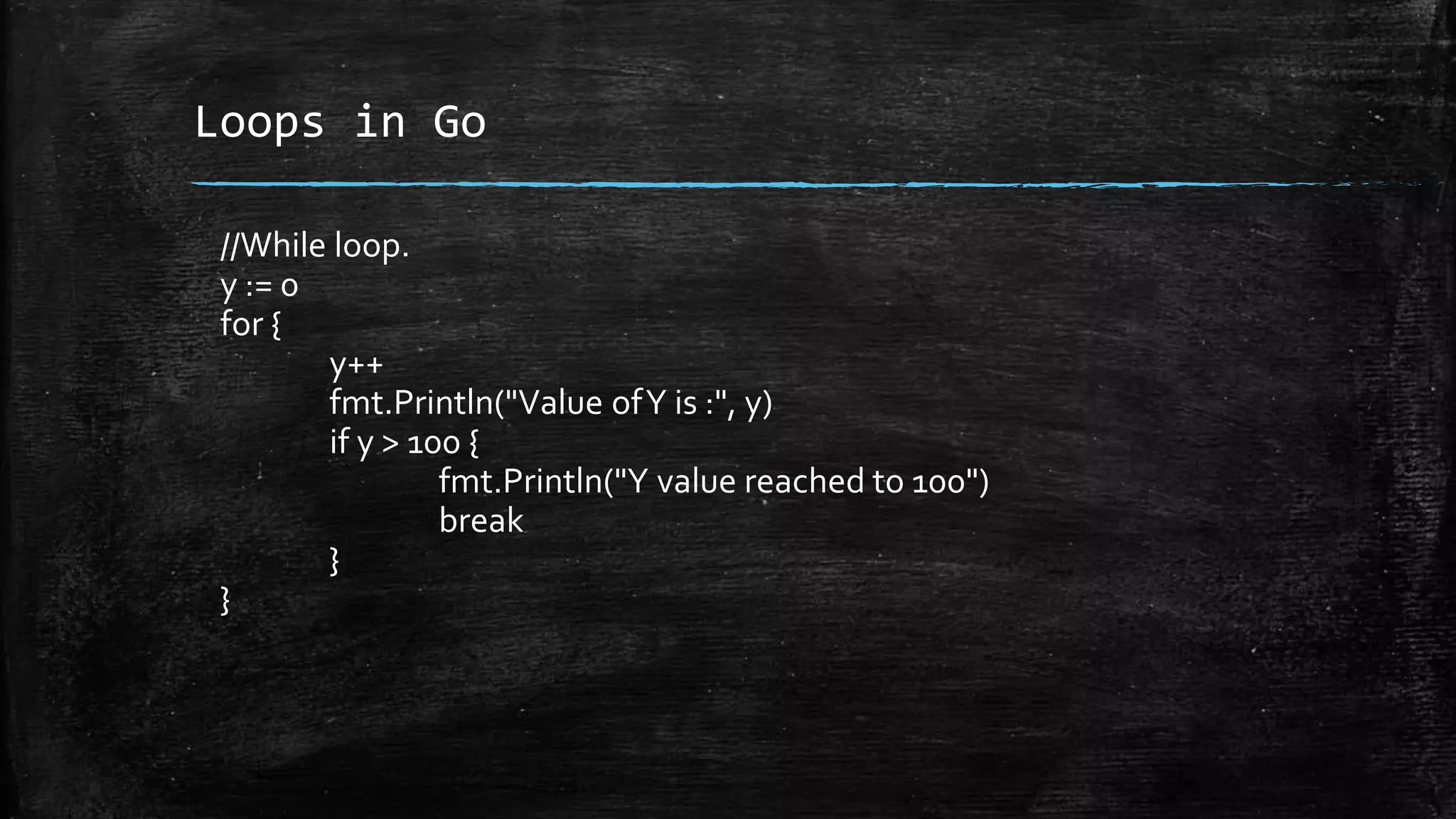
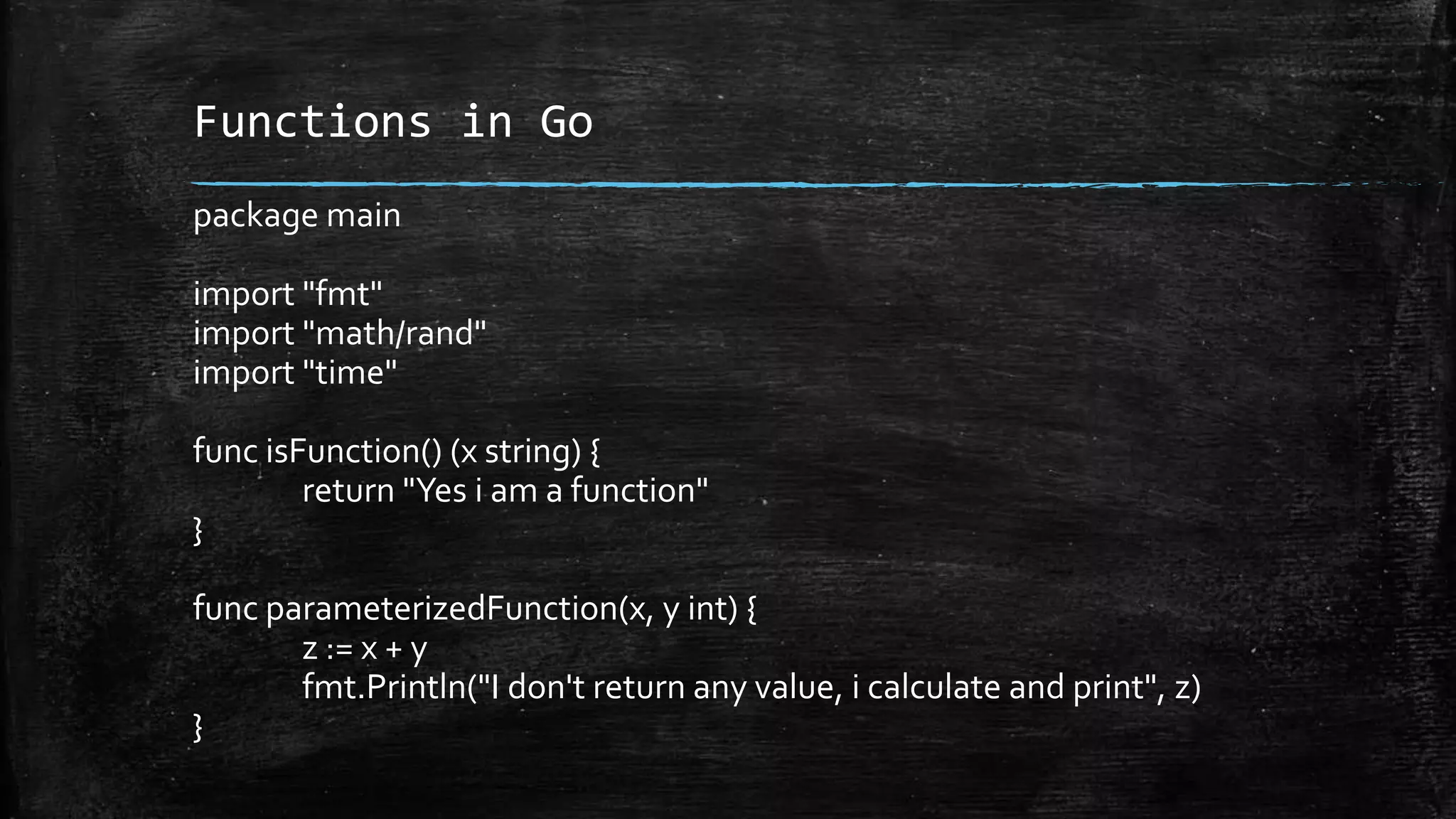
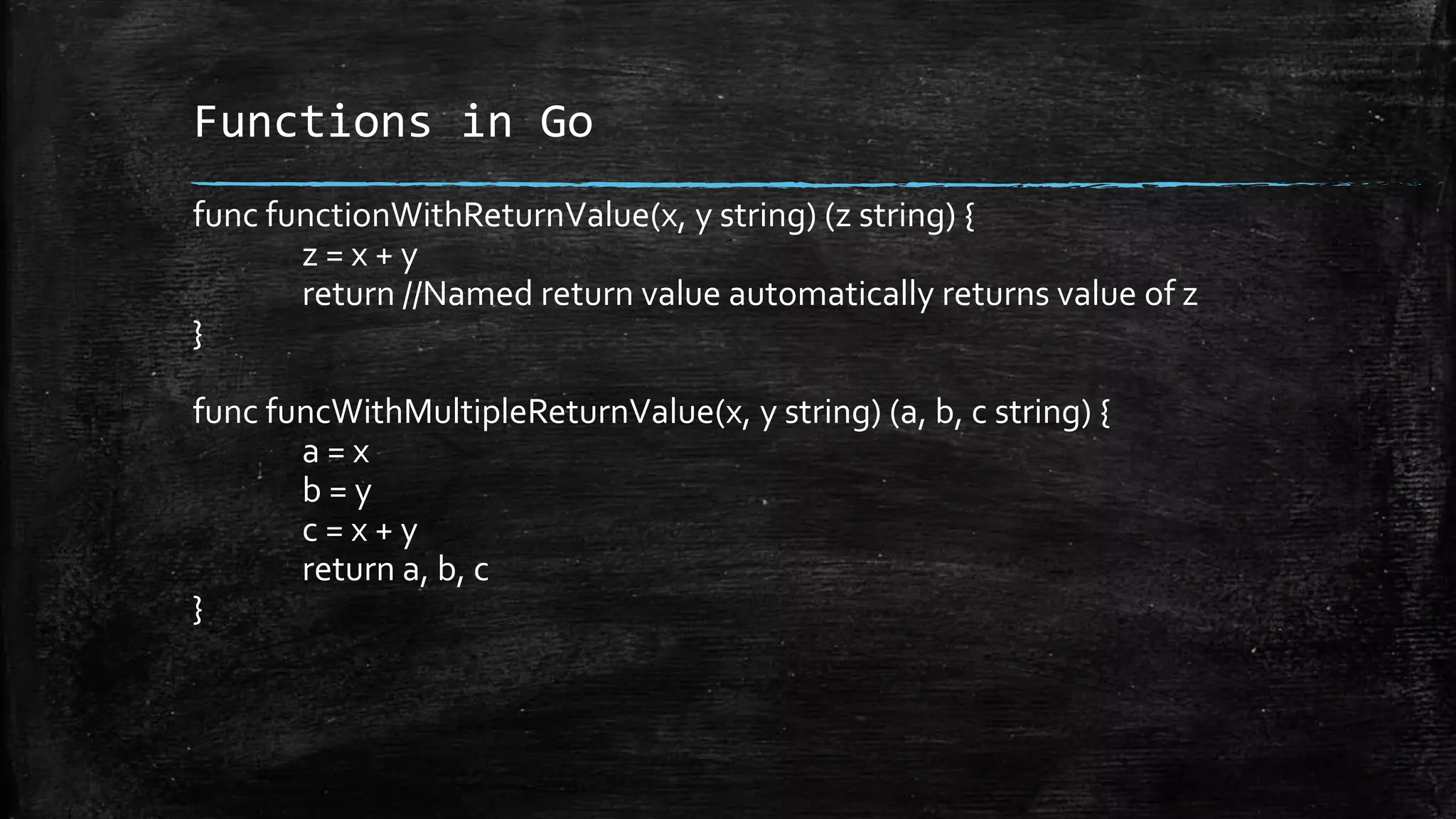
![Functions in Go
func doSameRandomAddition() (z int) {
var arr [100]int
for x := 0; x < 100; x++ {
rand.Seed(time.Now().UnixNano())
y := rand.Intn(1000000)
fmt.Println("Random number generated is", y)
arr[x] = y
}
for x := 0; x < 100; x++ {
z = z + arr[x]
}
return z
}](https://image.slidesharecdn.com/cccd0064-141c-42b0-903d-eba725fdca9c-161229122320/75/ProgrammingwithGOLang-11-2048.jpg)
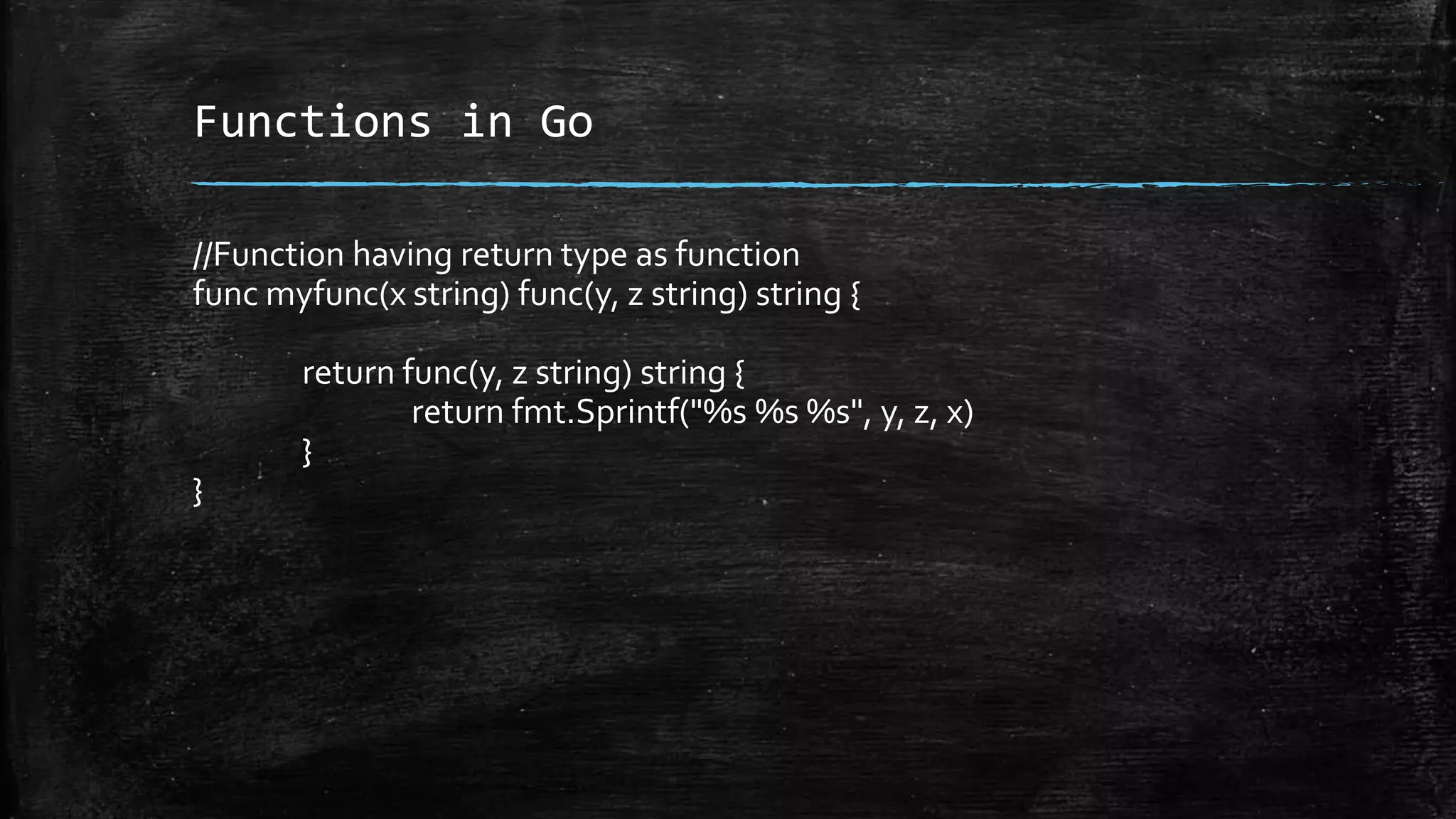
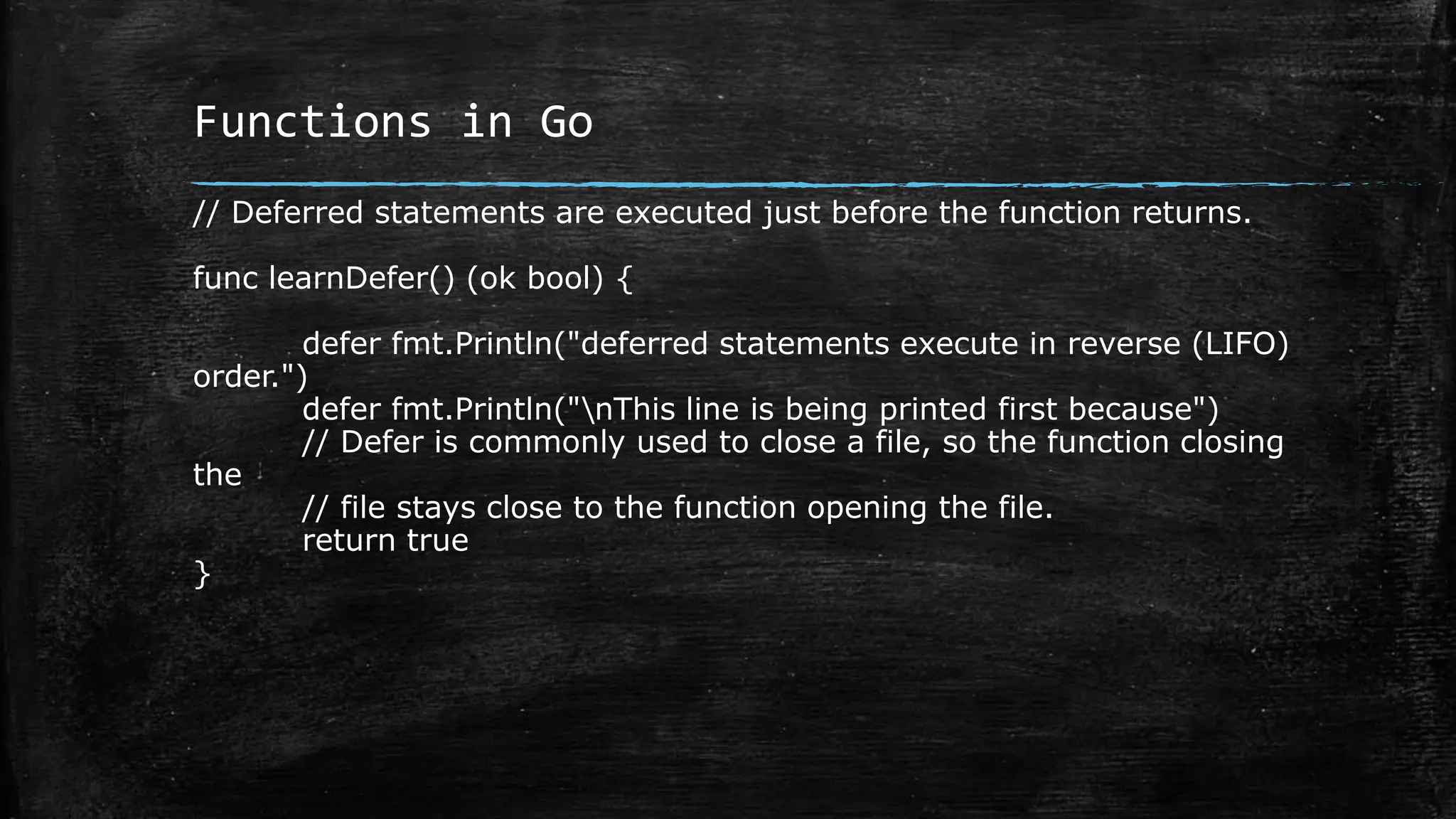
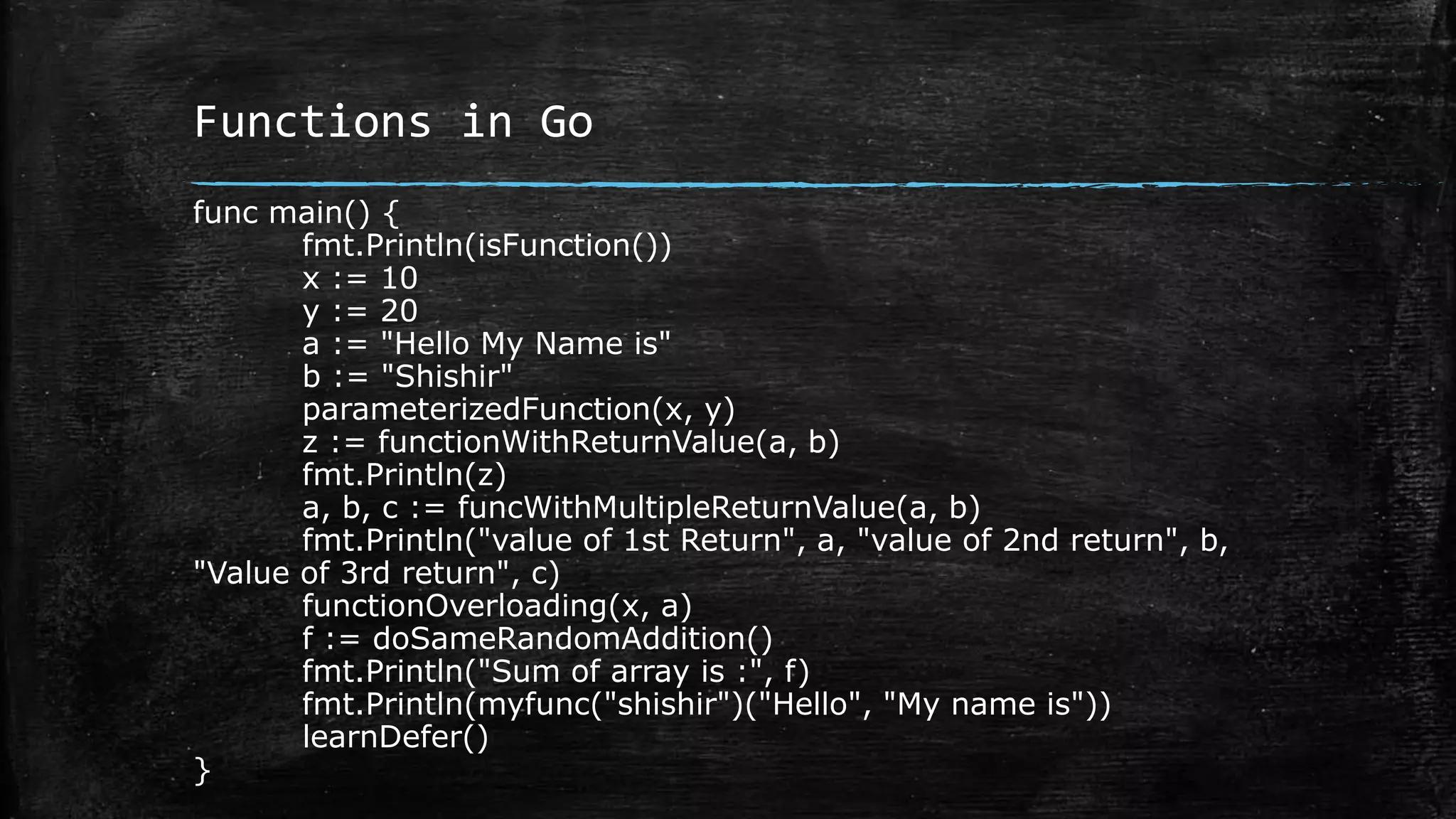
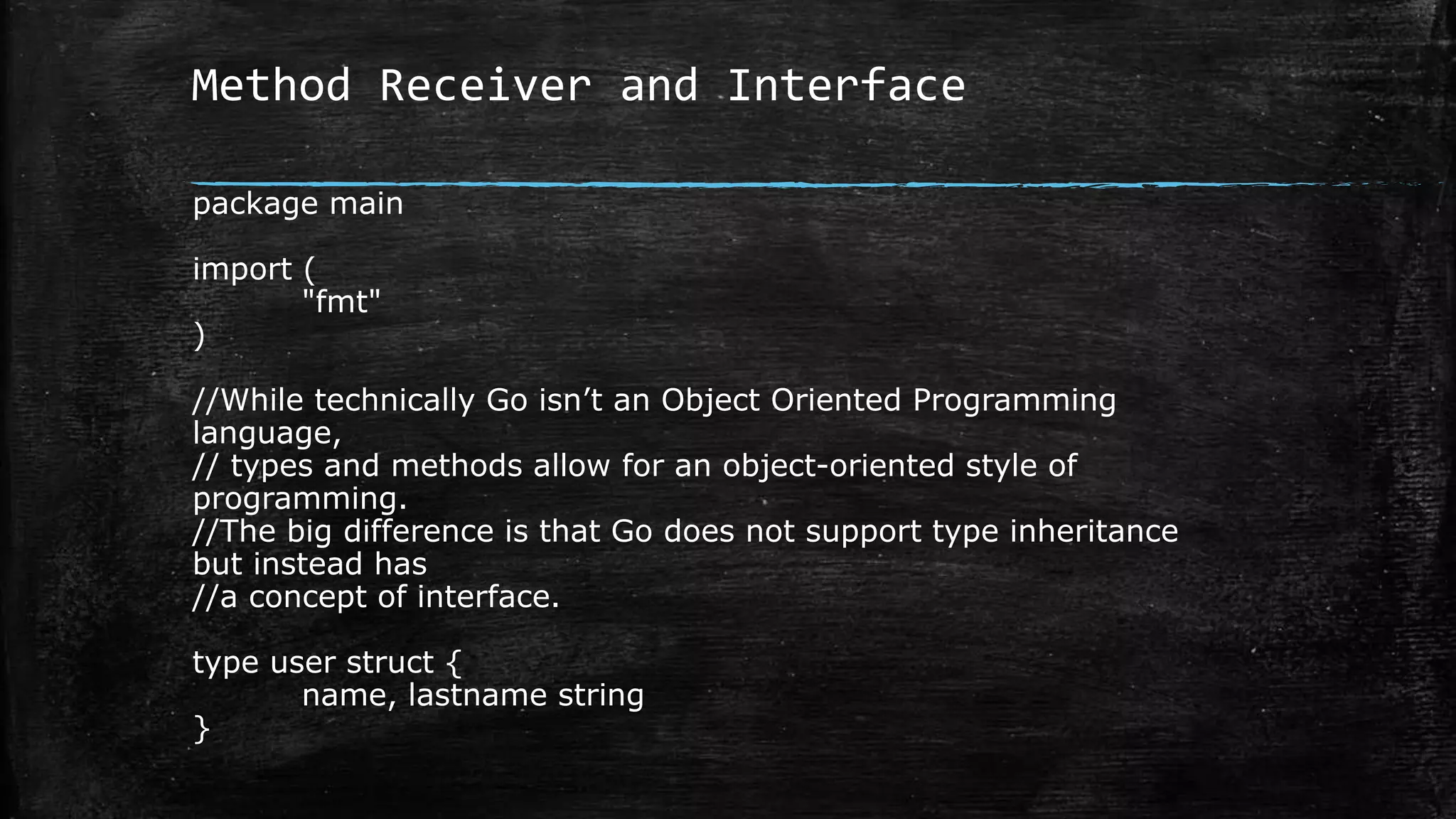
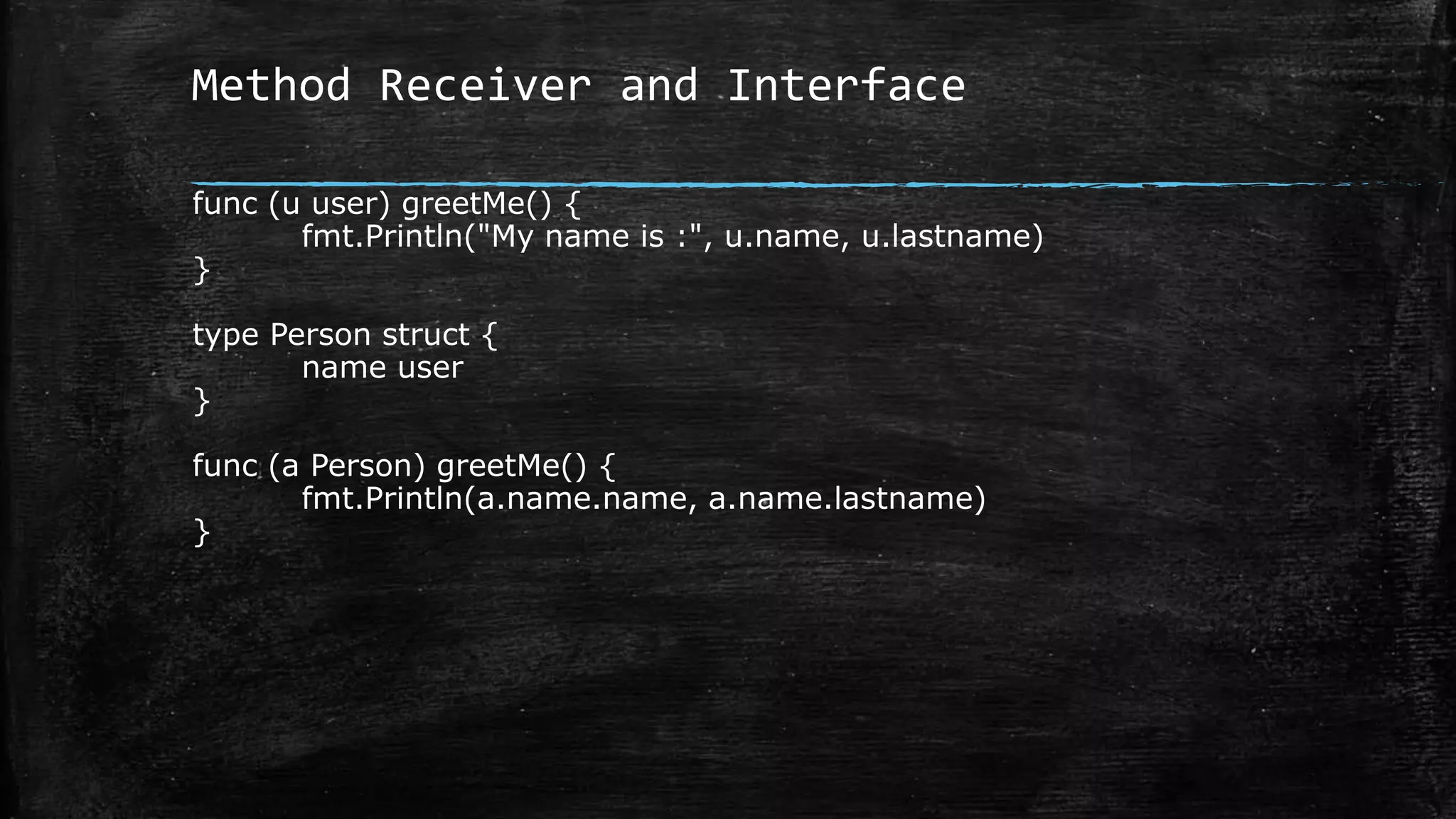
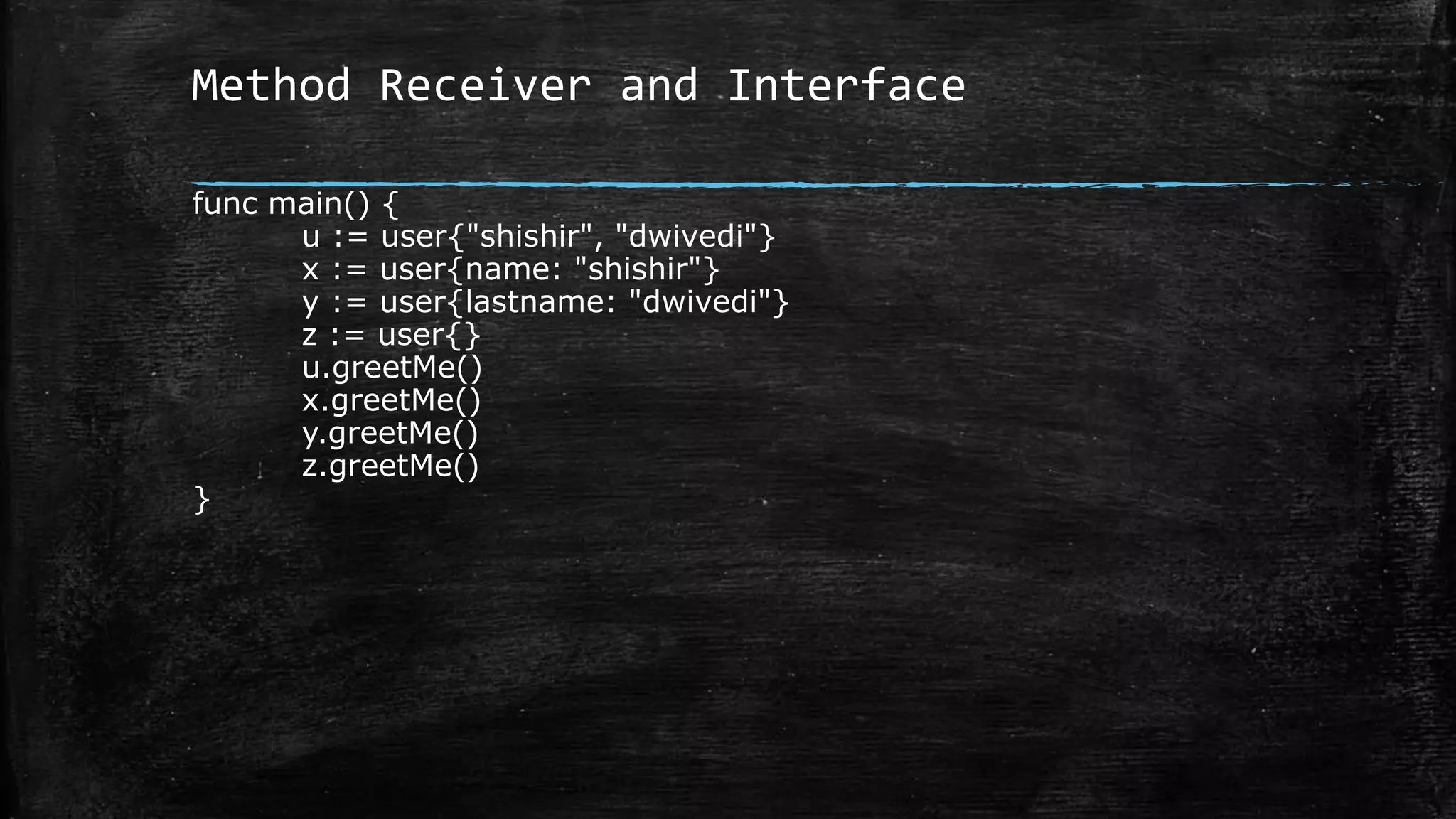
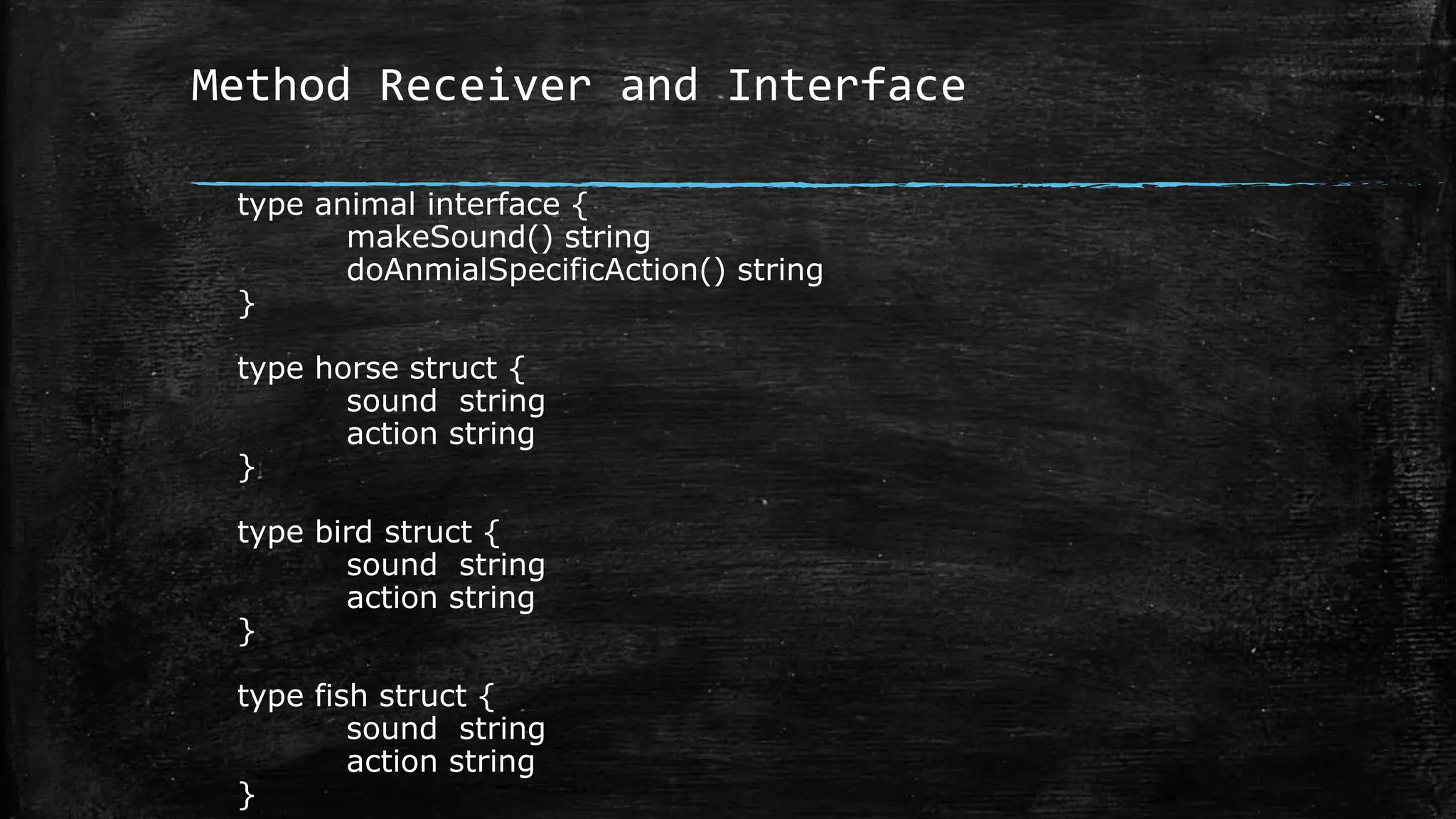
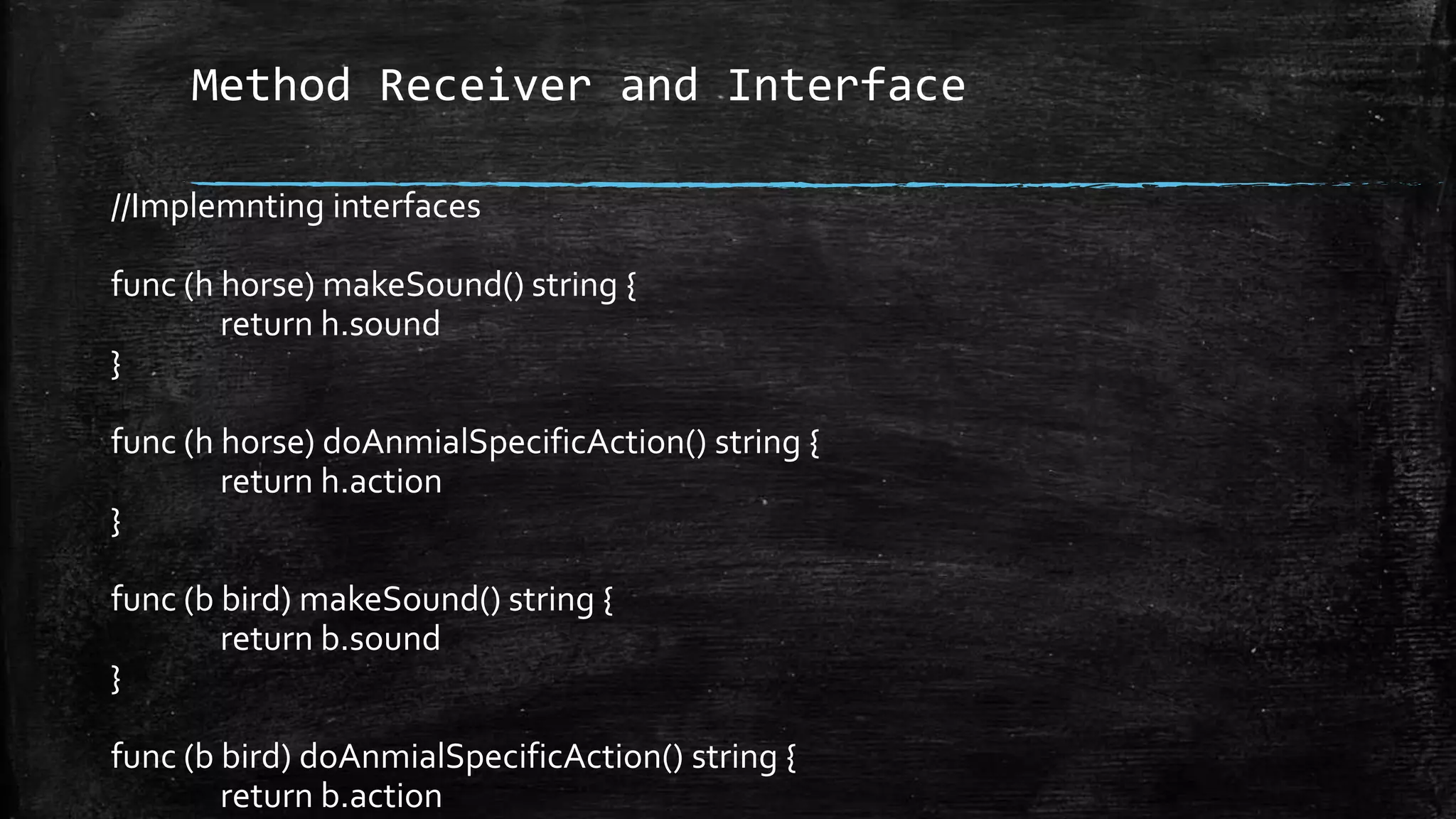
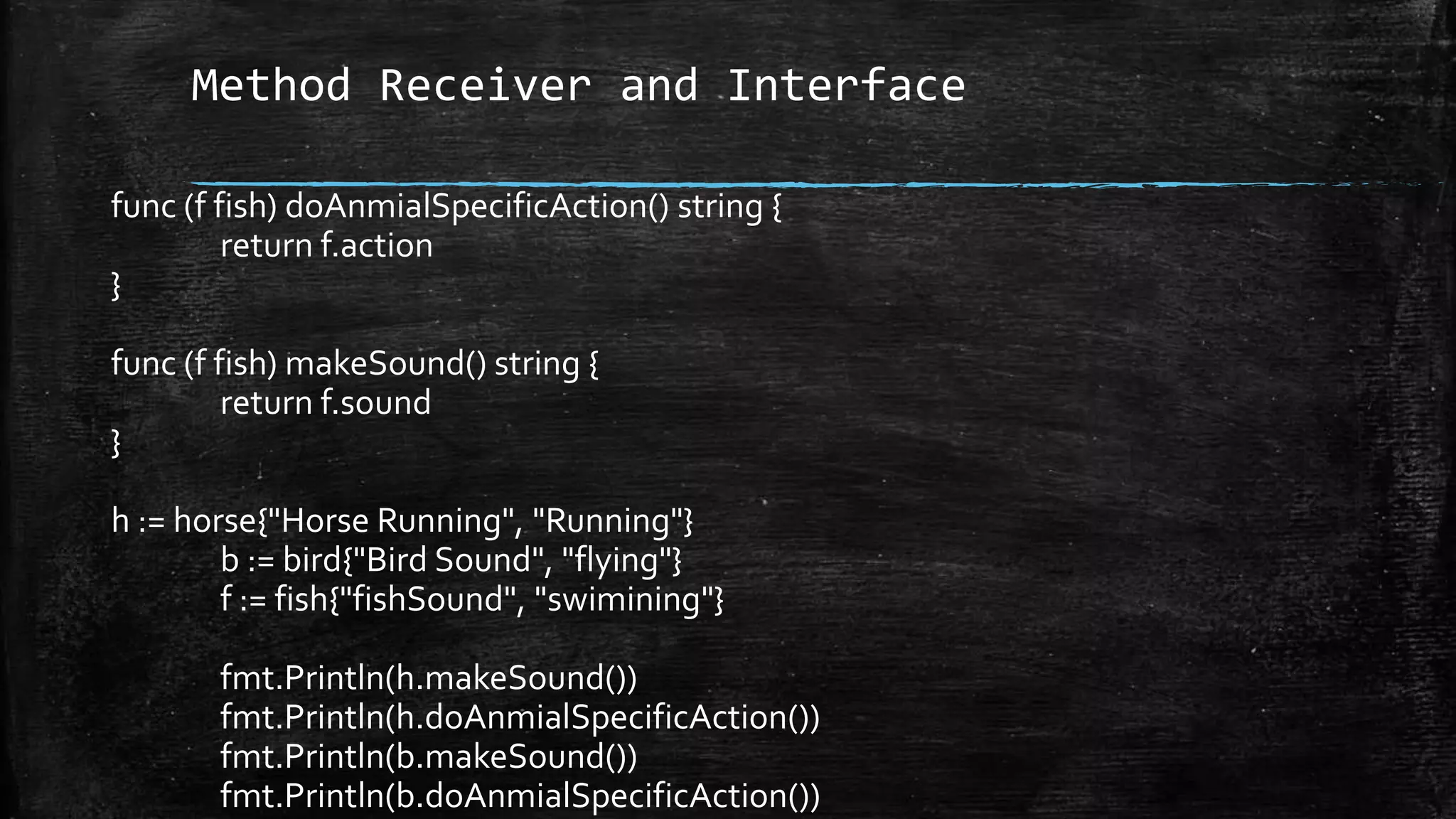
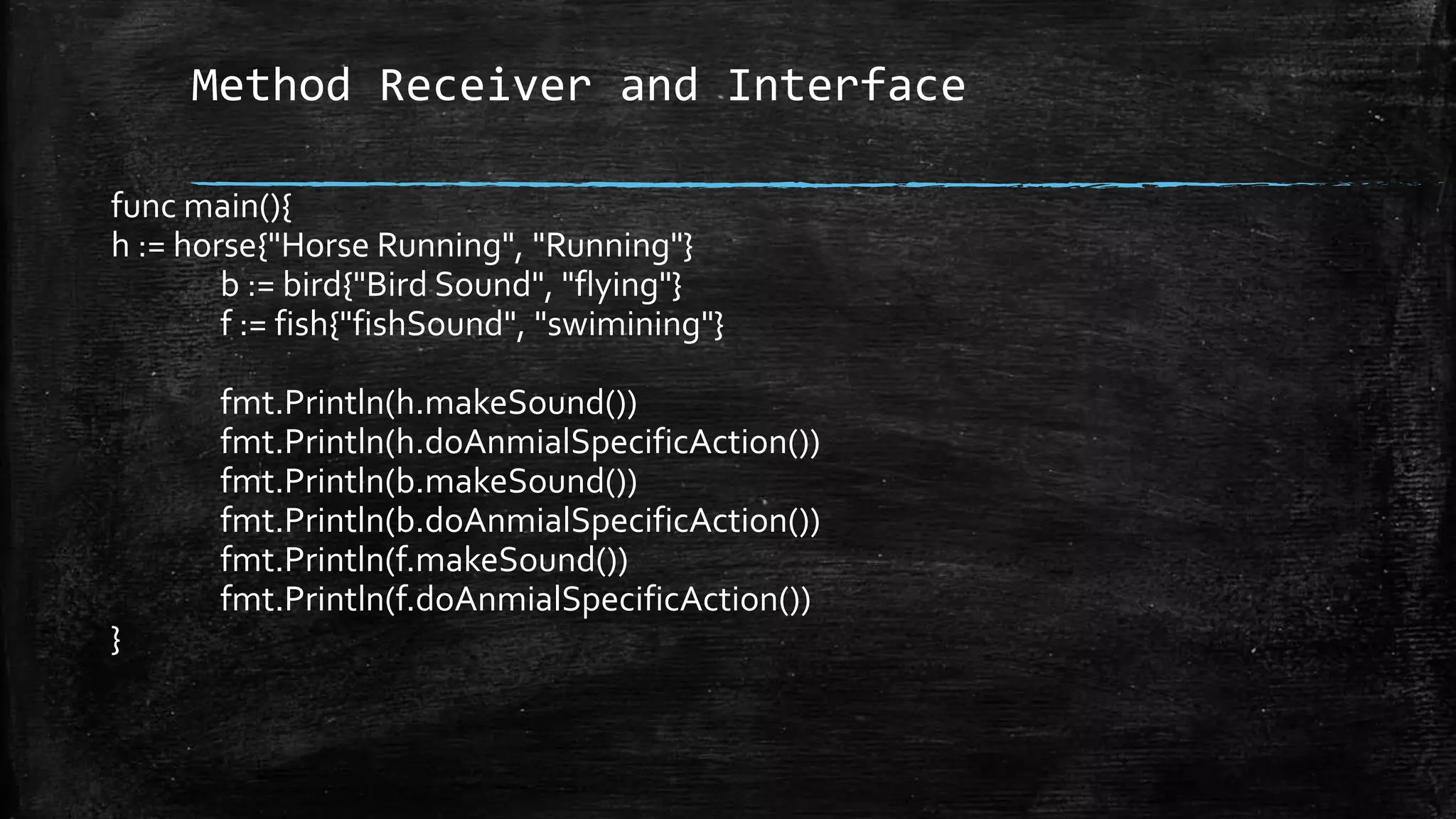
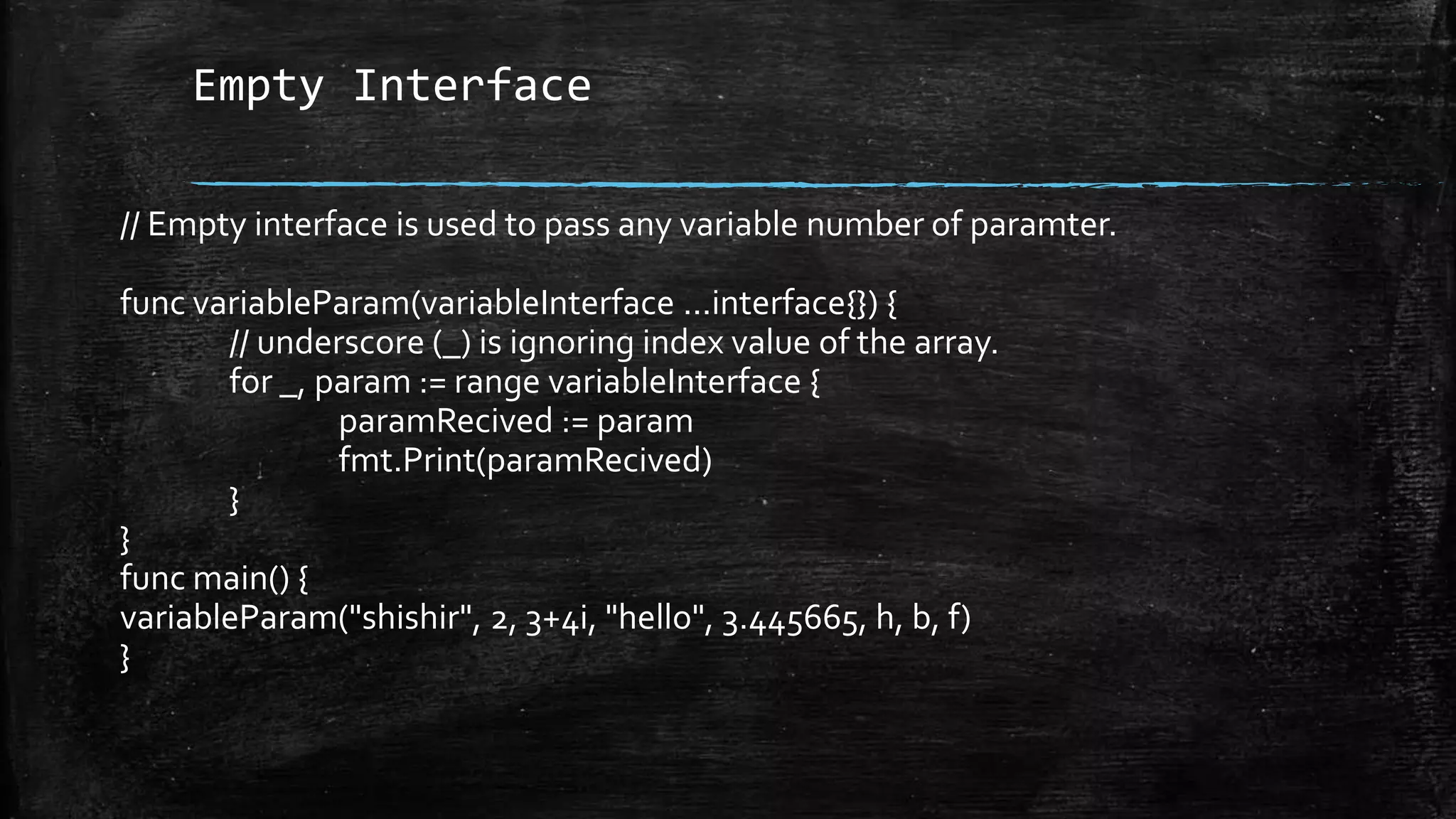
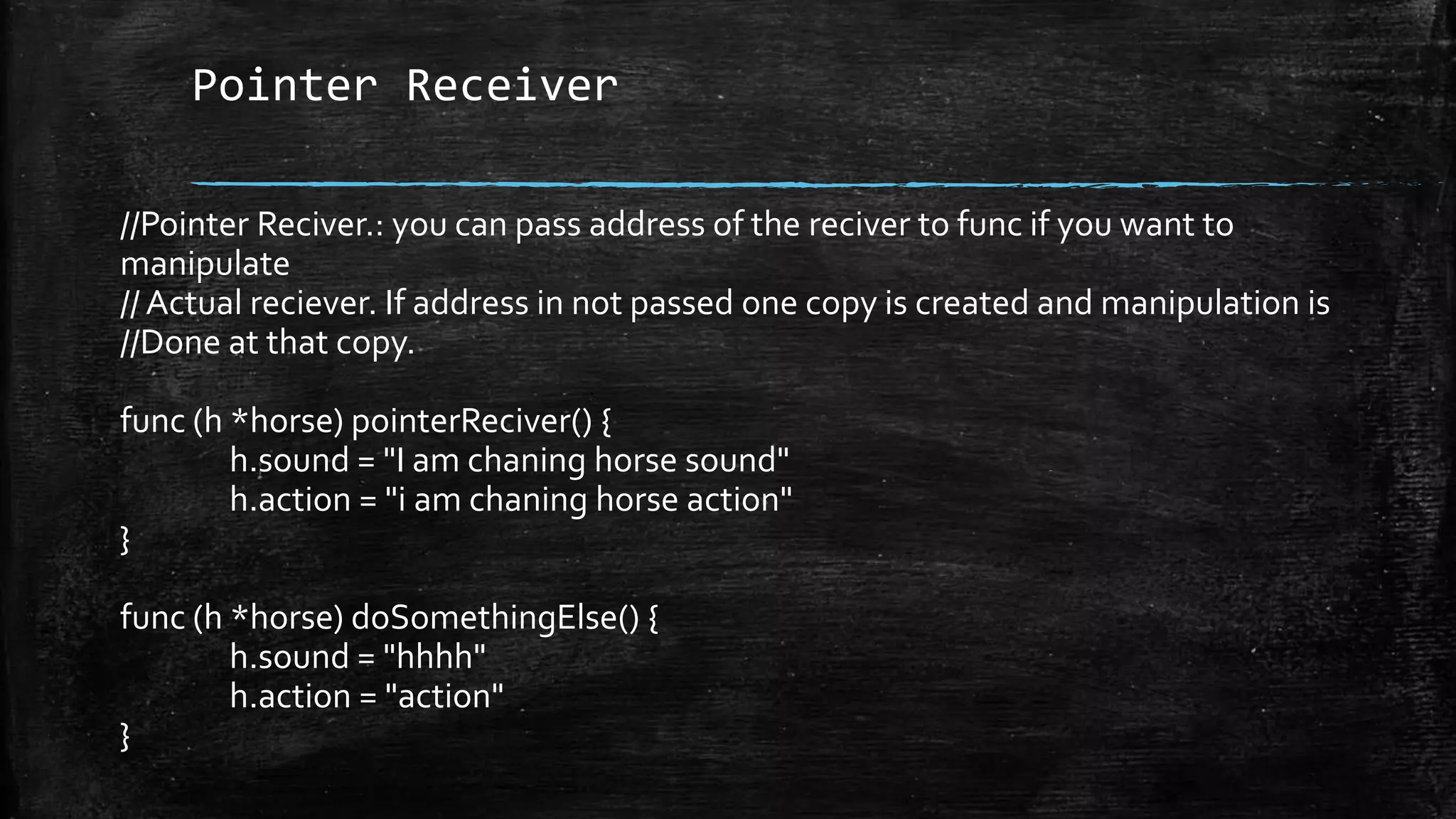
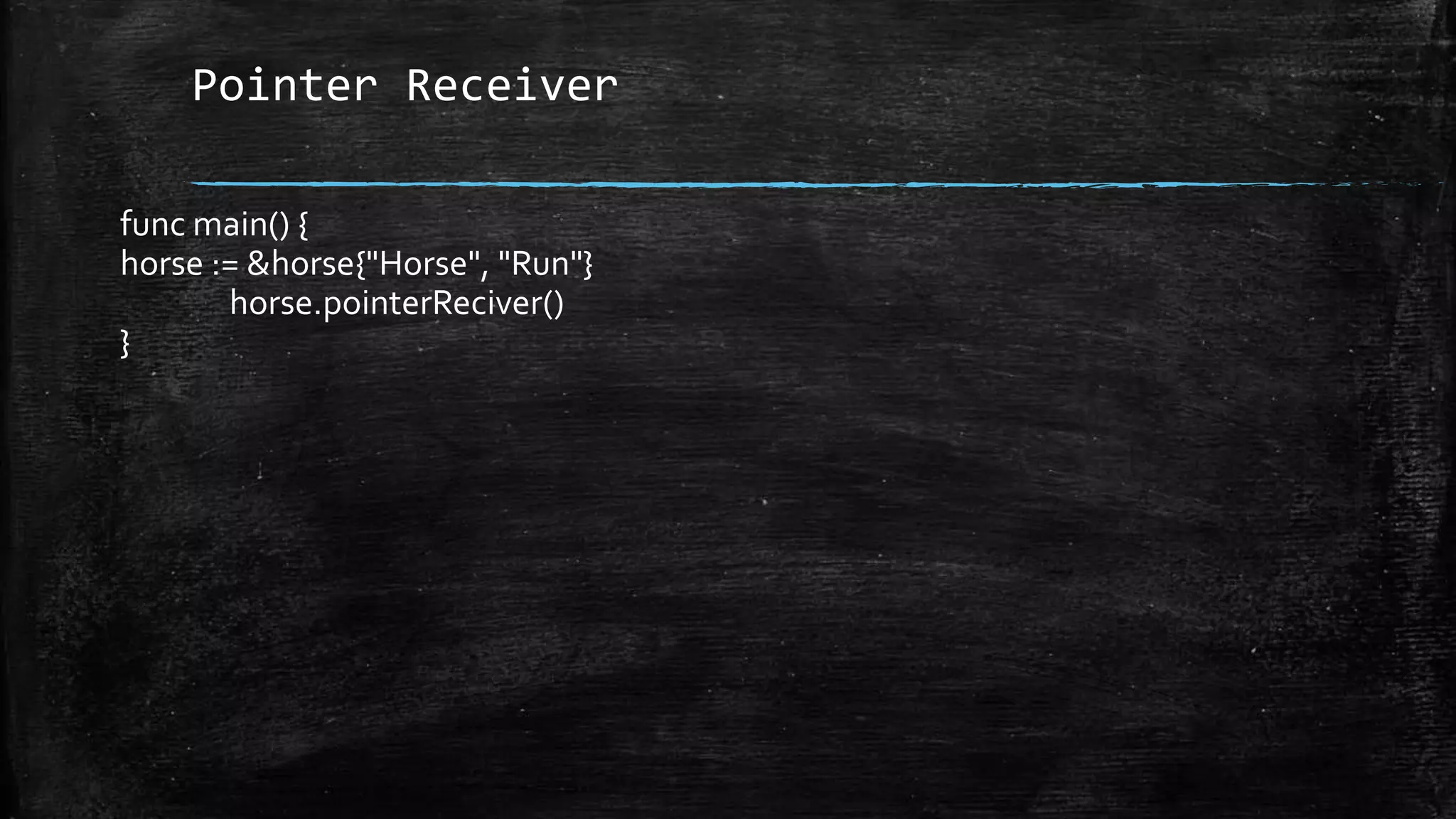
![Array Slice and Map
package main
import (
"fmt"
"math/rand"
"time"
)
//Function whose return type is array.
//Function should return with type and memory size as well.
func arrayFunction() (arr1 [100]int64) {
var arr [100]int64
for x := 0; x < 100; x++ {
rand.Seed(time.Now().UnixNano())
number := rand.Int63()
fmt.Println("Random number generated", number)
arr[x] = number
time.Sleep(10 * time.Nanosecond)
}
return arr
}](https://image.slidesharecdn.com/cccd0064-141c-42b0-903d-eba725fdca9c-161229122320/75/ProgrammingwithGOLang-25-2048.jpg)
![Array Slice and Map
//Slices
func sliceExample() {
lenOfString := 10
mySlice := make([]string, 0)
mySlice = append(mySlice, "shishir")
fmt.Println(mySlice, "Lenght of slice", len(mySlice))
mySlice = append(mySlice, "Dwivedi")
for x := 0; x < 100; x++ {
mySlice = append(mySlice, generateRandomString(lenOfString))
}
fmt.Print(mySlice)
x := mySlice[:10]
fmt.Println(x)
x = mySlice[:]
fmt.Println(x)
x = mySlice[20:]
fmt.Println(x)
}](https://image.slidesharecdn.com/cccd0064-141c-42b0-903d-eba725fdca9c-161229122320/75/ProgrammingwithGOLang-26-2048.jpg)
![Array Slice and Map
func generateRandomString(strlen int) string {
arr := make([]byte, strlen)
const chars = "abcdefghijklmnopqrstuvwxyz0123456789"
for x := 0; x < strlen; x++ {
rand.Seed(time.Now().UnixNano())
arr[x] = chars[rand.Intn(len(chars))]
time.Sleep(10 * time.Nanosecond)
}
return string(arr)
}](https://image.slidesharecdn.com/cccd0064-141c-42b0-903d-eba725fdca9c-161229122320/75/ProgrammingwithGOLang-27-2048.jpg)
![Array Slice and Map
func mapExample() {
mapList := make(map[string]int)
//adding random string as key and random int as value
for x := 0; x < 100; x++ {
rand.Seed(time.Now().UnixNano())
number := rand.Intn(x)
mapList[generateRandomString(10)] = number
time.Sleep(10 * time.Nanosecond)
}
//Printing Map using Range Iterator.
fmt.Println(mapList)
}](https://image.slidesharecdn.com/cccd0064-141c-42b0-903d-eba725fdca9c-161229122320/75/ProgrammingwithGOLang-28-2048.jpg)
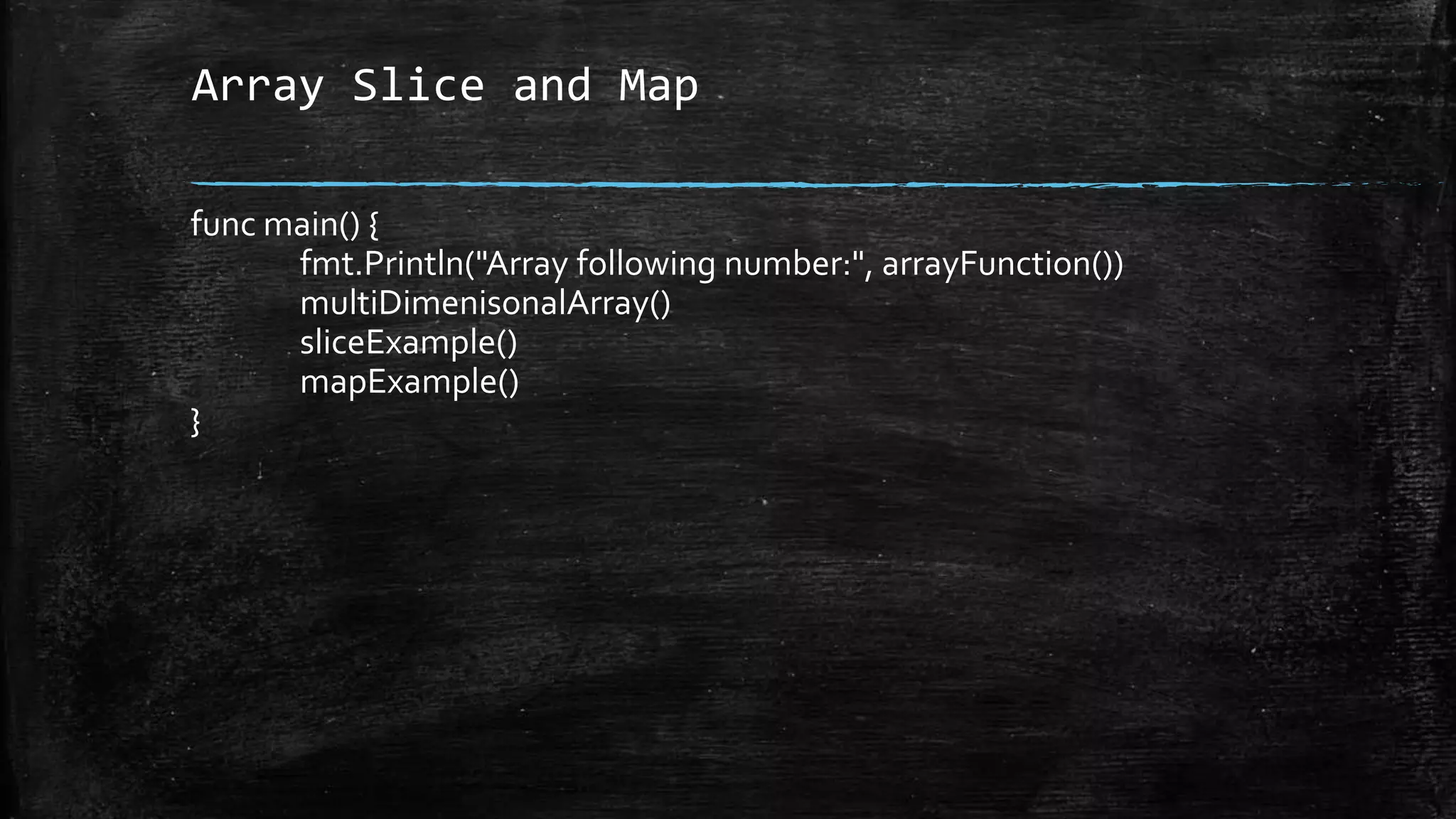
![Error Handling
func fileIOWithFlags() {
file, err := os.OpenFile("file.txt", os.O_CREATE|os.O_RDWR, 0660)
if err != nil {
size, _ := file.WriteString(generateRandomString(10))
fmt.Println(size)
}else{
fmt.Errorf(string(err.Error()))
}
}
func generateRandomString(strlen int) string {
arr := make([]byte, strlen)
const chars = "abcdefghijklmnopqrstuvwxyz0123456789"
for x := 0; x < strlen; x++ {
rand.Seed(time.Now().UnixNano())
arr[x] = chars[rand.Intn(len(chars))]
}
fmt.Println("String which is generated is:", string(arr))
return string(arr)
}](https://image.slidesharecdn.com/cccd0064-141c-42b0-903d-eba725fdca9c-161229122320/75/ProgrammingwithGOLang-30-2048.jpg)
